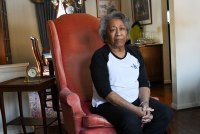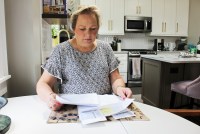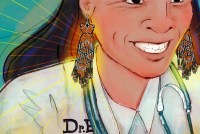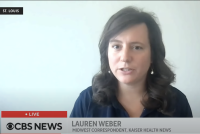Latest KFF Health News Stories
The July launch of the 988 Suicide & Crisis Lifeline was celebrated by many mental health providers and advocates, but it triggered concerns, too, from people who say using the service could lead to increased law enforcement involvement or forced hospitalization.
Exploitative practices in medical research have contributed to the underrepresentation of Native people in clinical trials. Episode 10 explores the efforts of Indigenous scientists to rebuild this broken trust through tribally controlled research.
KHN’s ‘What the Health?’: Kansas Makes a Statement
In the first official test vote since the Supreme Court overturned Roe v. Wade, voters in Kansas’ primary said in no uncertain terms they want to keep a right to abortion in their state constitution. Meanwhile, the Senate is still working to reach a vote before summer recess on its health care-climate-tax measure, but progress is slow. Tami Luhby of CNN, Sandhya Raman of CQ Roll Call, and Rachel Cohrs of Stat join KHN’s Julie Rovner to discuss these issues and more. Also this week, Rovner interviews KHN’s Bram Sable-Smith, who wrote the latest KHN-NPR “Bill of the Month” installment about a very expensive ambulance trip.
‘An Arm and a Leg’: Her Bill for a Prenatal Test Felt Like a ‘Bait-and-Switch’ Scheme
Her doctor told her the noninvasive genetic test would be $99. When she called, she was told $250 and if she didn’t pay quickly it could be $800.
Because of Texas Abortion Law, Her Wanted Pregnancy Became a Medical Nightmare
A Houston woman was 18 weeks pregnant when her water broke. That means her fetus had virtually no chance of survival, and she was at risk of an infection that could threaten her future fertility and even her life. Following Texas’ law, the hospital made her wait until she was showing signs of serious infection to terminate the pregnancy.
Hospices Have Become Big Business for Private Equity Firms, Raising Concerns About End-of-Life Care
Private equity firms are seeing opportunities for profit in hospice care, once the domain of nonprofit organizations. The investment companies are transforming the industry — and might be jeopardizing patient care — in the process.
KHN’s ‘What the Health?’: Manchin Makes a Deal
In a rare surprise for official Washington, Senate Majority Leader Chuck Schumer and Sen. Joe Manchin (D-W.Va.) announced a deal to expand the planned health bill in the Senate to include provisions raising taxes and addressing climate change. The measure would include a third year of expanded subsidies for the Affordable Care Act, but not health care coverage for people left out of Medicaid in states that failed to expand the program. Meanwhile, the ACA goes back to court, and the Biden administration restores anti-discrimination protections for LGBTQ+ people that were rolled back by the Trump administration. Joanne Kenen of the Johns Hopkins Bloomberg School of Public Health and Politico, Sarah Karlin-Smith of the Pink Sheet, and Alice Miranda Ollstein of Politico join KHN’s Julie Rovner to discuss these issues and more. Also this week, Rovner interviews Dr. Céline Gounder of KHN about the latest on the monkeypox outbreak.
Watch: Navigating Social Media After Mass Shootings
A University of Pennsylvania professor shares advice on navigating the intersection of gun violence and social media as part of KHN’s new “Spotlight” interview series.
Nursing Homes Are Suing the Friends and Family of Residents to Collect Debts
Debt lawsuits — long a byproduct of America’s medical debt crisis — can ensnare not only patients but also those who help sick and older people be admitted to nursing homes, a KHN-NPR investigation finds.
Listen: Can California Lower the Price of Insulin?
California Healthline senior correspondent Angela Hart describes California’s ambitious plan to manufacture generic insulin under the state’s new “CalRx” drug label.
The Ambulance Chased One Patient Into Collections
After a car wreck, three siblings were transported to the same hospital by ambulances from three separate districts. The sibling with the most minor injuries got the biggest bill.
‘American Diagnosis’: Two Indigenous Students Share Their Path to Medicine
A lack of Native physicians means many tribal communities rely on doctors who don’t share their lived experience, culture, or spiritual beliefs. In Episode 9, meet two medical students working to join the ranks of Indigenous physicians.
‘True Cost of Aging’ Index Shows Many Seniors Can’t Afford Basic Necessities
The Elder Index, developed by researchers at the University of Massachusetts-Boston, shows that nearly 5 million older women living alone, 2 million older men living alone, and more than 2 million older couples have incomes that make them economically insecure.
KHN’s ‘What the Health?’: Drug Price Bill Is a Go in the Senate
Two things happened in Washington this week that were inevitable: President Joe Biden tested positive for covid-19, and the Senate agreed to move forward on a budget bill that includes only a sliver of what Biden hoped it would. Still, the bill to allow Medicare to negotiate some drug prices, cap out-of-pocket drug costs for seniors, and extend temporary subsidies for Affordable Care Act insurance premiums would represent a major step if Democrats can get it across the finish line. Meanwhile, abortion battles continue to escalate around the country, with Texas leading the way in restrictions. Shefali Luthra of The 19th, Joanne Kenen of the Johns Hopkins Bloomberg School of Public Health and Politico, and Rachel Cohrs of Stat join KHN’s Julie Rovner to discuss these issues and more. Also this week, Rovner interviews Dr. Jack Resneck Jr., the new president of the American Medical Association.
Watch: Why the Public Health System Is Having Trouble Containing Monkeypox
KHN Midwest correspondent Lauren Weber appeared on CBS News’ streaming network to discuss “Fighting Monkeypox, Sexual Health Clinics Are Underfunded and Ill-Equipped,” an article she wrote with KHN senior correspondent Liz Szabo. It details how ill-equipped the nation’s sexual health clinics and public health system are to tackle monkeypox after decades of underfunding. Weber described […]
In Some States, Voters Will Get to Decide the Future of Abortion Rights
Measures to enshrine the right to abortion in the state constitution will be on the ballot in California and Vermont this fall. Abortion-rights advocates in Michigan are hoping their state will follow suit.
Listen: Why Medical Debt Touches Every Corner of America
KHN senior correspondent Noam N. Levey joined WBEZ and Wisconsin Public Radio to talk about medical debt and health care costs in the U.S.
KHN’s ‘What the Health?’: Life After ‘Roe’ Is … Confusing
A rapidly changing landscape for abortion has left patients, providers, employers, and lawmakers alike wondering what is and is not legal and what to do next. Meanwhile, Democrats in Congress have resumed negotiations on legislation to lower drug prices and, potentially, continue expanded insurance subsidies for the Affordable Care Act. Alice Miranda Ollstein of Politico, Tami Luhby of CNN, and Sandhya Raman of CQ Roll Call join KHN’s Julie Rovner to discuss these issues and more. Plus, for extra credit, the panelists recommend their favorite health policy stories of the week they think you should read, too.
‘American Diagnosis’: A Tribal Court in California Works to Heal Family Separation
Indigenous people in the United States face disproportionately high rates of incarceration and family separation through the foster care system. Episode 8 explores the Yurok Tribal Court’s efforts to keep families together.
Self-Managed Abortions Gain Attention, but Helpers Risk Legal Trouble
A network of organizations help women use medication to end early pregnancies safely. But it’s a legal gray area in Tennessee and other states that restrict abortion.























